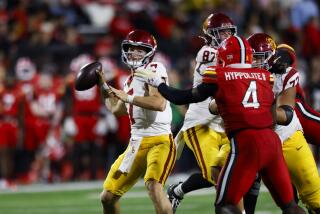Terry Riley’s Worldly, Inventive Night Music
Far from the madding Oscars--well, only a few miles from the Shrine but a universe away from “Shine”--the Leo S. Bing Theater of the Los Angeles County Museum of Art paid an inspiring tribute to musical well-being Monday night. Terry Riley, the legendary keyboard player and composer from Northern California, made a much too rare local appearance, at the Monday Evening Concerts, where he was joined by the remarkable Italian bassist Stefano Scodanibbio.
Riley’s performances are easier to experience than to explain. He is a musician of enormous sophistication and technical ability, a musician who finds the center of tones and enters into them in the genuine hope of discovering something essential about the lifting of our spirits.
Indeed, future musicologists have guaranteed employment in attempting to pick apart a semi-improvised solo piano piece like Monday night’s “Night Music,” where Riley spun rapid hallucinatory patterns in the left hand, use the sustaining pedal to independently create secondary unpredictable drones, all the while exploring a cosmic chordal blues in the right hand.
This is music derived from many parts of the globe and from different eras. It has the improvisatory flair, the rhythmic exhilaration and the melodic subtly of the music of India, which Riley has studied for decades. But it is also grounded in classical tradition and jazz, in the advanced keyboard techniques of Chopin, in the harmonic richness of the Impressionists, in the ecstatic improvisations of Coltrane.
And yet Riley’s music seems so little about any of those specific things. He is a model of the concentrated, centered performer. He sits at the keyboard still and focused, giving the impression that he is the ego-less vessel through which the music is poured out. And the result is not a postmodern jumble of musical cultures and traditions but the sense of a single idea being elaborated.
There is also, in Riley, something not terribly common in music today: a sense of mystery. Even for those of us who have followed Riley’s music for many years, it’s hard to know just what it is he’s up to, or where it will lead. In fact, the very programming Monday was hard to figure out in the traditional sense.
It consisted of Riley singing in the style of Indian raga, with Scodanibbio accompanying, using the bass for drones as if it were an Indian tabla. There was also Riley’s 26-minute rendition of “Night Music,” from 1995, which included pre-composed and improvised material, although there was no telling where one began and the other ended in its brilliant display of keyboard virtuosity and stunning pianistic effects.
Scodanibbio performed a solo number, in which he tapped and strummed and rubbed bow on strings to produce harmonics and sound effects unlike anything I have ever heard on the bass. He has the reputation for being the most inventive bass player of our time, and he lives up to it.
Finally, Riley, on synthesizer, and Scodanibbio performed works that seemed to follow the jazz procedure, in that some elements were worked out in advance but room was left for improvisation. But again everything from jazz to raga to minimalist motor techniques (of which Riley was one of the founders) found their way into these works.
The crowd for this Monday was not as large as it might have been--probably because of the Oscars and the fact that the Monday Evening Concerts series doesn’t seem to be on too many radar screens these days. But those who were there were mostly young and rapt and in no hurry to leave when it was over, since Riley, music’s least elitist performer, stayed in the lobby long afterward happily chatting with fans.
More to Read
The biggest entertainment stories
Get our big stories about Hollywood, film, television, music, arts, culture and more right in your inbox as soon as they publish.
You may occasionally receive promotional content from the Los Angeles Times.











